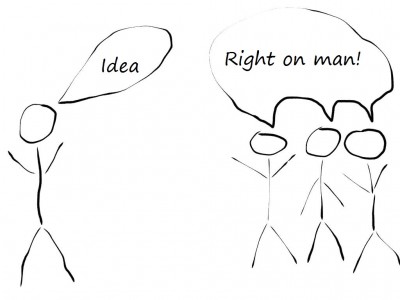
I don’t know how so many pundits had reactions polished and published within hours of the announcement of the news of the murders of Gil-ad Shaar, Eyal Yifrach, and Naftali Fraenkel. I wanted to take time to let the shock dull a little, then write something about it. My thoughts are still a little disjointed, but I think they’re worth sharing nonetheless. After all, I’ve hitchhiked home from the Gush before, it could have been me. It could have easily been someone I know.
I think absolutely everybody in the world, but especially us PC-conscious Millennials need to read this op-ed by Mark Yudof, a former university president, published last week in the Forward, “The Freedom for Hearing Offensive Speech.” In it, he paints a disturbing picture of a dystopian campus environment where students often begin their justifications for silencing speakers they don’t like, usually Zionists, “with a misreading of the First Amendment, not realizing that freedom from government censorship is what is at the core. But I fear the problem runs deeper. … They believed I failed to grasp that constitutional rights were for marginalized groups, not for the ‘privileged.’ … The line between intolerance and definable privilege apparently is a blurred one.”
What Yudof describes is the intellectual cloistering of today’s culture, people barricading themselves behind whatever chunks of facts support their reality, living in the world where you and your side are always correct about everything, sometimes presenting it to the other side in online or real-life “debates” just so that you can shut them down in the global marketplace of ideas. As Yudof writes, “If you think you are in the right on gun control or affirmative action or foreign policy or whatever, if you are passionate about making a better world, why should one tolerate the speech of the misguided troglodytes who oppose your point of view?”
Echo chambers such as these are why the murders happened, why so many Palestinians were so sickeningly happy about them, why the far-right in Israel wants wanton vengeance of the type the Bible says is reserved for God alone, and why no reasonable person has trouble believing that 16-year-old Muhammed Abu Khdeir’s death was a revenge killing. Echo chambers are also a reason why so many op-eds about the tragedy came out so soon after the news broke–their loudest voices needed to rush to tell the world (but mostly just their followers) how the tragedy reaffirms what they already know is the answer.
So what to do? I get my morals largely from religion, but I also understand that my religious beliefs can’t be proven in any non-circular way, so I am humble about them when dealing with others, unlike some closely-held American corporations people. My job helps. My qualification for publishing an op-ed isn’t whether I agree with it, but how well it’s argued. This is sometimes very difficult, sometimes even painful, but urging writers to better develop viewpoints I don’t share has been one of the best things that’s ever happened to me. I couldn’t fall into an echo chamber even if I tried because I’m constantly reminded that the other side is human, intelligent, and capable of coherent, convincing thought. So yes, part of the solution is that everyone needs to read New Voices more* (that’s why we’re New Voices as opposed to Old, Echo-y Voices), but more to the point, we need more public discussion with humble recognition that we are all fallible humans. We need to realize that there are many, many, many things we don’t know and others do, and we need to assume that the other side isn’t evil, idiots, or liars, and if they are, that usually becomes apparent soon enough. We need to be willing to admit we are wrong and equally willing to apologize and change our minds and courses of action when we learn that we are, but this can only happen when everyone is equally committed to this system. Overcoming arrogance, stepping out of the echo chamber, is the only way we’ll ever know peace, not because we’ll have stopped disagreeing, but because we’ll have learned to do it productively.
There is a line from the Talmud that made its way into the Shabbat morning service: “Disciples of scholars increase peace in the world.” Rabbinic literature has fierce disagreements on every page, even the language used to describe their debates is often violent: he threw down, he challenged, the best minds are described as “shield bearers,”etc.—how can more students of these scholars lead to increased peace? A teacher of mine explained that it’s because the scholars knew how to debate the right way—by constantly engaging with those whom they passionately disagreed; in other words, they never got stuck in echo chambers. At the day’s end, they didn’t refuse to come back to the study hall until their opponents were banned or shake hands and agree to disagree while nothing changed, they fought until they were proven wrong, and, once proven wrong or voted against, they (usually) capitulated and went along with it for the greater good. In other words, they were more committed to the truth and the greater good than they were to being “right.” For the sake of peace, that’s what we need more of today.
Yet right now it seems we’re far from that point. For the love of God, prove me wrong.
.
*You might say we are an echo chamber for progressive Jewish views. I strongly disagree, but that is a separate post.
Derek M. Kwait graduated from the University of Pittsburgh and is editor in chief of New Voices.

